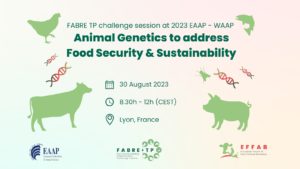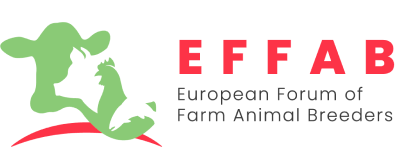FABRE TP at EAAP 2023 - Animal Genetics to address Food Security & Sustainability

Food security exists when populations have physical and financial access to sufficient, safe, and nutritious food that meets their dietary needs and food preferences for a healthy life. We all need to produce and consume food sustainably while reducing food waste, GHG emissions and the use of resources and improving animal health, welfare, and food quality. Current crises due to the aggression of Russia on Ukraine have shown how access to affordable, healthy, and sustainable food could be compromised.
The importance of farmed animals is vital not only for diets, manure, or diversification in agricultural systems but also for the livelihoods of millions of people and the vitality of rural areas across the globe. In its many forms, animal production plays an integral role in the food system by turning inedible crops for humans into highly nutritious, protein-rich food too. Available technologies and innovation in animal genetics open the door to more sustainable production systems. Societal and ethical concerns related to animal welfare standards and the use of technology are increasing due to the association of genomic technics with enhancing animal productivity. Transparency of animal breeding strategies and the responsible use of technologies are needed.
Modern animal breeding is the responsible combination of different breeding goals and traits balanced between them, including novel breeding goals and traits. The self-regulative initiative, Code EFABAR, recognises the role of resilience and sustainability in safeguarding food security by showing a commitment to practising responsible use of technologies and balanced breeding.
In this FABRE TP challenge session, we will discuss these topics and the application of animal genetics to alleviate the pressure. We want to invite experts to have constructive debates on the importance of animal genetics, diversity and techniques that could be considered in future breeding programmes. The regulatory framework, ethics, and societal context of food production with all the necessary and relevant stakeholders in this debate are essential. Code EFABAR, more knowledge gained on animal genomes and traits of vital importance could go towards a progressive regulatory approach to look at the potential of NGTs and other technological advances in the animal breeding and reproductive sector.
If you will attend EAAP 2023, join us on Wednesday 30th of August from 8.30h to 12h (CEST) to discuss together!
